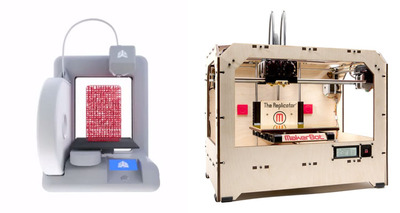 After CES it now seems we have a two-horse race for the lead in personal 3D printing: MakerBot and 3D Systems. Both announced new printers (the MakerBot Replicator and the Cube), while 3D Systems added a comprehensive 3D community/store/service to compete with MakerBot’s Thingiverse.
After CES it now seems we have a two-horse race for the lead in personal 3D printing: MakerBot and 3D Systems. Both announced new printers (the MakerBot Replicator and the Cube), while 3D Systems added a comprehensive 3D community/store/service to compete with MakerBot’s Thingiverse. But that’s about where the similarities end. MakerBot’s philosophy revolves around the idea of personal making and open source, whereas 3D Systems is more focused on consumers less capable of making – and their approach is less open source and has more capitalism involved. Thingiverse’s repository is full of items free for the taking, while 3D Systems’ Cubify store requires varying levels of payment for the 3D models. Different approaches for different audiences.
Which approach will win? In the short term we think both, simply because the 3D printing market is basically wide open. The number of personal 3D printers sold to date is only in the low tens of thousands, while literally billions of people have never even heard about it, let alone use one. In the long term it may be that 3D Systems’ approach may overtake MakerBot’s simply because there are far more “non-makers” in the world.
Regardless of who’s winning, it will be an interesting race to watch in 2012.


Personally, I think they will both "win" – each appeal to a different market, really, although there is cross-over between them. 3d Systems will probably end up selling more units and making more profit, simply due to the commercial push to market and so forth, and having a wider audience – but Makerbot will help bring down the cost and increase innovation, I think.
I'm glad there are both – when companies compete, consumers win, as they say.
Personally, I think they will both "win" – each appeal to a different market, really, although there is cross-over between them. 3d Systems will probably end up selling more units and making more profit, simply due to the commercial push to market and so forth, and having a wider audience – but Makerbot will help bring down the cost and increase innovation, I think.
I'm glad there are both – when companies compete, consumers win, as they say.